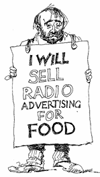“Web search leader Google Inc. is hiring scores of radio sales people and is spending heavily in a bid to expand its position in the $20 billion radio industry. Google spokesman Michael Mayzel said this week that the company will begin a public test of Google Audio Ads by the end of the year. Advertisers will be able to go online and sign up for targeted radio ads using the same AdWords system they use to buy Web search ads.” — Reuters
Tag Archives: advertising
Should Google buy Clear Channel?
Article in AdAge briefly explores that question. The phrase that jumped out of the story at me was, “automated sale of remnant ads.”
“Right now, through Google’s year-ago acquisition of dMarc, a radio systems company, it has been able to create an automated way to sell what is mostly remnant radio inventory, which remains unsold until the last minute. But, noted Mr. Bank, Google Audio is making several high-profile hires in the radio sales field in major radio markets. Now why, if Google Audio’s selling of remnant ad time is so automated, would there need to be so many high-priced radio ad sales folks.”
I’m pretty sure a big chunk of my salary for the past 20 years has come from acquiring and selling “remnant radio inventory.” Should companies that trade services for commercials on radio stations (we call it barter) be concerned about this? My guess is most station managers would rather have cash for his unsold commercials.
The Google-Clear Channel idea is an interesting one. CC has lot of stations and Google has figured some things out about advertising.
Kissing Test
You know I’m a sucker for chimps.
New Get a Mac ads (2006)
 If you haven’t seen the new series of Get a Mac ads you probably will. The Better Results ad hits close to home for me because I used Windows apps to create videos for the three or four years. It worked, but…
If you haven’t seen the new series of Get a Mac ads you probably will. The Better Results ad hits close to home for me because I used Windows apps to create videos for the three or four years. It worked, but…
Counselor and Self Pity both make their respective points very cleverly. I have never seen a campaign bring out so many different versions of an ad, so quickly, and keep the quality so high. [link above is to a compilation of all the ads]
Broadcasting on the web
Interesting analysis of TV station websites by Graeme Newell. The piece is buried in a long, no-way-to-deeplink post on ShopTalk, so I’m posting the full article after the jump.
“The problem is our mindset. We’re trying to recreate broadcasting on the web. We do the web just like we do TV – broad. There is just a little bit of everything and not enough of anything. Because of its very nature, TV news has evolved to become a headline service. Our web sites mirror our on-air broadcast. You usually leave our web sites still hungry, wishing for a little more meat on the bone.”
“In the future, successful stations will have a hundred different broadband channels, all of them geared towards a specific demo. Give up your need to be a broadcaster. We are now nichecasters and the web gives us a whole new way to bring new audiences to our door.”
It’s worth a read because I think it applies to a lot of radio station websites as well as TV. Maybe even some radio network websites?
Google going forward with radio plans
 Google CEO Eric Schmidt says Google’s plans to begin placing radio ads by the end of this year remain on schedule, contradicting recent talk within the industry that the company had postponed the project.
Google CEO Eric Schmidt says Google’s plans to begin placing radio ads by the end of this year remain on schedule, contradicting recent talk within the industry that the company had postponed the project.
“The tests are going extremely well,” said Schmidt, who added Google eventually plans to employ about 1,000 workers in its radio division. [E-Commerce Times via Hear 2.0]
White House Press Secretary Tony Snow doing a radio commercials
Radio Iowa News Director (and blogger) O. Kay Henderson heard White House Press Secretary Tony Snow doing a radio commercial on a Des Moines radio station this week and found it blog-worthy. The New York Times liked the story too:
“Just imagine, you’re listening to the radio, Tony Snow has been speaking to you as the spokesman for the leader of the free world, and then a commercial comes on with him trying to sell you a window,” Ms. Henderson said Thursday. “He introduced himself as Tony Snow, talked about the travails of remodeling projects, boasted about the 30-year history of this business and delivered the 800 number of the business, twice.”
My favorite quote from the story was by Mr. Snow: “It’s like, you don’t have the White House press secretary flacking siding.”
I suppose Kay could have done a “human interest” piece for our network but this is perfect blog-fodder. Not a big deal, just interesting. And how many reporters heard the White House Press Secretary shilling windows on the radio and didn’t think to follow up on it?
Internet advertising closing in on radio
The Internet will receive a greater share of global advertising spending this year than do outdoor outlets such as billboards, and it is set to overtake radio soon. That’s one of the findings in a report by ZenithOptimedia, a media planning and buying firm. The growth is being driven by smaller brands, which are turning to the Internet because it is relatively cheap and can target their markets effectively. (see The Long Tail) The company said it expected the spending share gap between the Internet and radio to narrow from 3.9 percentage points in 2005 to 0.7 in 2008. (Yahoo! News/Reuters)
If you understand how to market and sell online, this is not necessarily a bad thing. If you don’t… then pray that these are new dollars that won’t impact your sales.
Radio listeners don’t mind ads
Mark Ramsey points to this Arbitron study that concludes radio listeners don’t tune out when commercials come on. And wonders about the implications:
“If listeners don’t mind spots then why should they mind mediocre songs? And what ARE they listening through the spots for?”
The whizzing sound you hear is thousands of radio sales reps emailing the Arbitron study back and forth.
989 people out of 1,000 listen to radio
Regular readers know I’m a fan of Mark Ramsey’s blog, Hear 2.0. Mark is the president of San Diego-based Mercury Radio Research, which recently conducted a 1,000-person national study of radio listening habits of people ages 12 through 54. Just 11 people said they didn’t listen to radio.
Mark spoke at one of the sessions at the NAB Radio Show, underway this week in Dallas and the Dallas Morning News covered:
“One of the key things that makes radio different from all these others (iPods, satellite radio, Internet radio, etc) and makes it stand out, and valuable, is the fact that there’s stuff between the songs that people value. In fact, the loyalty to the stations, preference for those stations, is driven very much by what’s between those songs. It’s about connecting with other people.”
Here’s Mark’s take on commercials:
“…there’s one group that hates commercials and another that can tolerate them. The issue with commercials seems to be, ‘Look, if you’re a zealot about commercials, well, of course you’re going to listen to an iPod.’ People inherently understand that commercials are a tax that you pay. The issue for radio is whether we demonstrate to them what that tax is buying them. … ‘Are we giving people something that’s worth the price they’re paying in commercials?’
That wasn’t such a scary question when there were no alternatives to the radio.
Note to self: Record a couple of hours of morning drive on one of the local radio stations and edit out everyhing except the “stuff between the songs that people value.”
Comment from Jim M:
“It seems to me the ratio between commercial time and music / content is way out of whack compared to what it used to be. I wonder if there are some statistics on how this ratio has evolved over time? I was thinking about this today, again, when a drive to the store and back treated me to 100% advertising. I like commercial radio for the fact that I can pick up on new music and the variety, but finding music these days seems to be truly hit and miss.”
